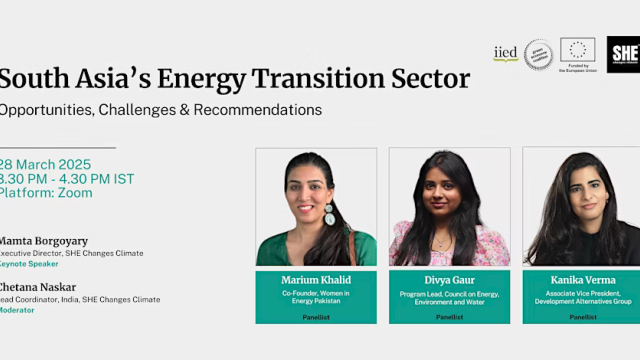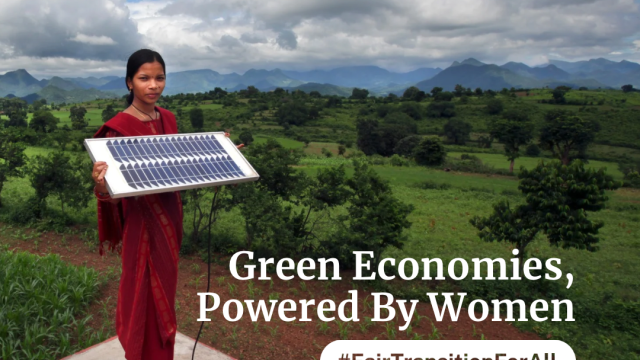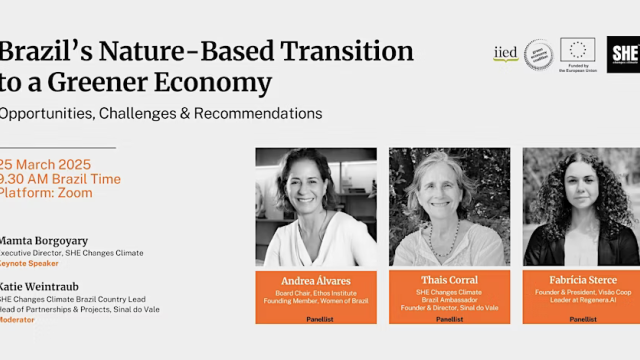The future of work is green
To celebrate International Workers Day, we explore how a green jobs programme is the best way to build back better for a post-COVID recovery
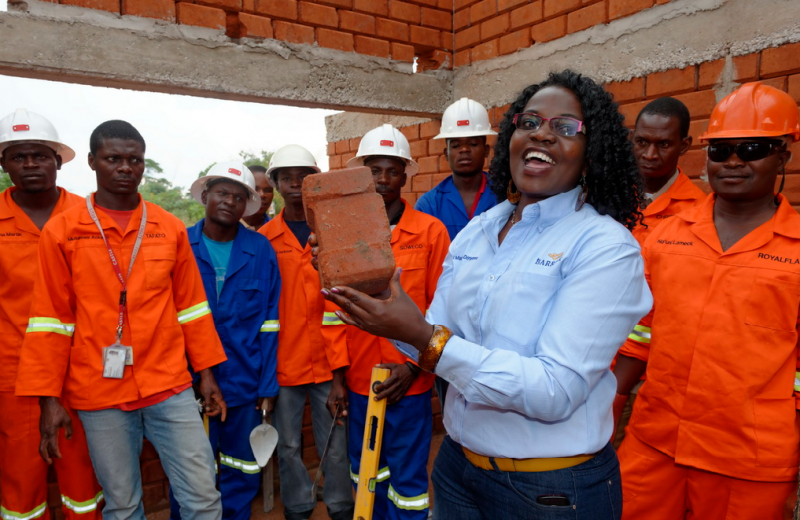
Today, May the 1st, is International Workers Day, a celebration of the world’s workers held across the world. This year we must especially celebrate our health care workers for their courageous efforts to stem the tide of the COVID-19 pandemic. Yet the social and economic impact of the ongoing lockdown has affected 4 out of 5 of the world’s 2.7 billion workers, leaving millions jobless.
Global estimates grow grimmer by the week as the quarantine measures begin to hit economies and labour markets hard. The International Labour Organization warns that 1.6 billion workers in the informal economy – nearly half of the global workforce – face the danger of having their livelihoods destroyed. Informal workers are most often in vulnerable employment, working without employment contracts, with little or no social protection measures, workplace rights or decent working conditions.
As countries begin to relax lockdown measures, looking to balance public health a the need to revive their economies, economic stimulus packages are being put forward. Many regions and countries are calling for a green and just recovery from the pandemic, in line with existing (pre-Covid 19) commitments to address the impacts of the intertwined inequality, climate and biodiversity crises. Investing in green jobs offers the promise of addressing long-term resilience and sustainability and, if designed well, can promote and strengthen social inclusion.
A Green and Just Recovery
The global economy recovery from this pandemic presents an unprecedented opportunity to put forward transformative policy solutions that put people and planet at the core. The African Union has committed to advance renewable energy across the continent as part of the region’s response to Covid-19, simultaneously addressing the challenge of energy access of the 600 million people who do not have access to electricity in Africa. The European Union has placed the EU Green Deal, the region’s long term growth strategy, as the central framework for social and economic recovery plans. South Korea’s governing party has followed suite, winning a national election in April with its own Green New Deal plan. During the health crisis, Pakistan has stepped up efforts on its five-year campaign to plant 10 billion trees, tripling the number of work opportunities on offer in 2020. This has provided a lifeline to tens of thousands of out-of-work labourers who are now able to sustain their families.
Economies have to be rebuilt – at a scale likely to exceed both the 2008 Global Financial Crisis and the Great Depression of the 1930s. But this crisis has also exposed and amplified the fault lines in our economies – that ignore the burden of unpaid care work borne largely by women, that do not provide adequate support to small businesses, the bedrock of local economies, and that are blind to our dependence on nature and climate systems.
“ this crisis has also exposed and amplified the fault lines in our economies: ignoring unpaid care work borne by women, failing small businesses, and blind to our dependence on nature.”
The time is right to put the holistic policy solutions, models and frameworks that have been developed over the last decade, including green jobs, on the table. We need to build back better by investing in a new economy that reinvigorates job creation, that strengthens social protection measures and that pushes for strong climate and biodiversity action. As UN Secretary General António Guterres noted on Earth Day on 22 April 2020, the money spent to recover from the corona virus should deliver “new jobs and businesses through a clean, green transition and needs to be tied to achieving green jobs and sustainable growth.”
Green jobs, good jobs
Green jobs involve many kinds of jobs, across economic sectors and with the participation of a diverse urban and rural workforce, in both the formal and informal economies. These jobs protect and restore the environment, build society’s resilience to climate impacts and address declining environmental quality.
Green jobs, according to the ILO, refer to jobs that help to protect ecosystems and biodiversity, reduce energy, materials, and water consumption, decarbonise the economy and minimise or altogether avoid generation of all forms of waste and pollution. The greening of traditional economic sectors such as agriculture, manufacturing and construction, or new, emerging green sectors such as renewable energy, energy efficiency or recycling create green jobs. These should also be good jobs, offering equal access to women and men, providing workers with social protection and ensuring that workers are safe.
In the last decade, policies, programme and strategies to promote green jobs have emerged globally. New green occupations require new skills. Education and training programmes have evolved rapidly to keep pace with the changes in the labour market as the demand for green jobs grow. The Global Commission on the Future of Work identified the greening of economies among the central transitions impacting the future of work. This transition would create millions of jobs as countries adopt sustainable practices and clean technologies, with 24 million new jobs estimated to be created globally by 2030, if the right policies and the right skills to promote and respond to a greener economy are put in place.
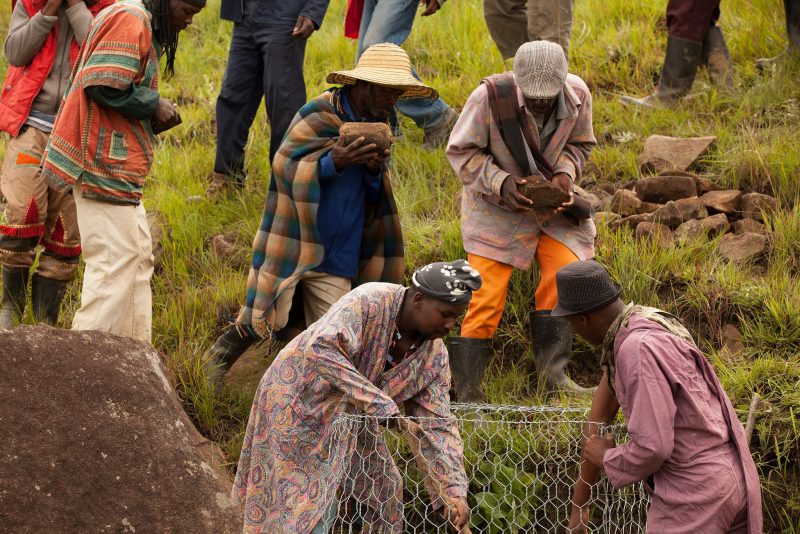
Increased investment in green jobs could also advance an inclusive future, since environmental degradation disproportionately affects vulnerable populations and low-income countries who largely depend on ecosystem services, heathy soils, rivers and seas, for their livelihoods and jobs. Labelled the ‘GDP of the poor’, ecosystem services make up between 50% and 90% of the total source of livelihoods among the world’s rural poor.
The economic stimulus packages being proposed to deal with the COVID-19 crisis must accelerate the transition towards good and green jobs. They could lead to greater synergies between social protection and environmental sustainability through large scale, labour-intensive ecosystem rehabilitation programmes that protect the environment, build skills and provide income. They could fast-track the greening of traditional sectors, construction, agriculture and transport, where investment is still needed to implement largescale industry transformations. And it could boost the energy transition, driven by renewable energy and energy efficiency, that promises to create close to 20 million new jobs for women and men globally by 2030.
The alliances for an inclusive green and just recovery from the Covid-19 pandemic, emerging at multiple levels, are key to delivering public policy solutions for inclusive, resilient and sustainable economies. Stimulus packages should invest in green jobs, jobs that are good for people and for the planet – and a critical lever to ensure that we restart this economy the right way.
- Najma Mohamed, GEC
